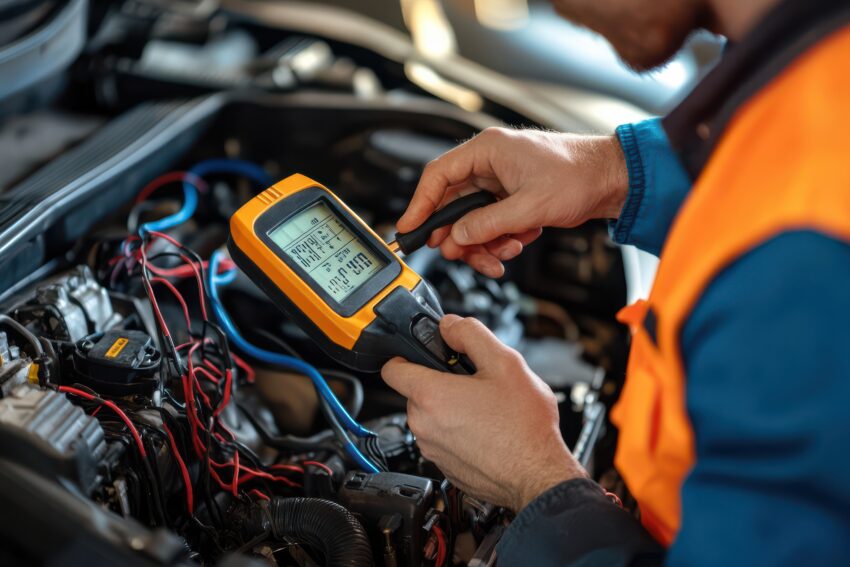Have you checked your car’s battery recently? If you’re unsure or can’t remember, you’re not alone—many people tend to forget until there’s a problem. Batteries tend to be one of those vehicle components that get overlooked until the day they stop working—usually at the most inconvenient time. Fortunately, with an automotive battery tester, you can take charge of your car’s battery health and avoid unexpected breakdowns.
What Is an Automotive Battery Tester?
An automotive battery tester is a handheld device designed to measure the health and performance of your car’s battery. Think of it as a health check-up for your battery. The tester evaluates various factors, such as the charge level, voltage, and overall condition, and gives you a report on whether the battery is in good shape or needs replacement.
Why Is It Important?
A battery that’s on its last legs doesn’t just mean your car might not start—it can affect the performance of other electronic systems in your vehicle. Avoiding this with regular testing ensures smooth operation and keeps you from being stranded on the side of the road.
How Automotive Battery Testers Work
Different types of battery testers use different methods to measure a battery’s condition, but they all share the same basic goal: checking the health of your battery.
Types of Battery Testers
- Load Testers: These simulate the load a car would place on the battery to measure how well it performs under stress.
- Conductance Testers: These measure electrical conductance to determine how efficiently current is passing through the battery.
Electrical Conductance Testers vs. Load Testers
Conductance testers are more common in modern testing, as they’re quicker and safer for the battery. However, traditional load testers can provide more accurate results when diagnosing performance under real-world conditions.
Benefits of Using an Automotive Battery Tester
Why bother testing your battery? Here are some of the key advantages.
Prolonging Battery Life
Regularly testing your battery ensures you catch minor issues before they become big problems. This prevents unnecessary wear and tear, helping you extend the lifespan of your battery.
Avoiding Unexpected Battery Failures
No one enjoys being stuck with a dead battery. By checking your battery’s status regularly, you’ll know in advance when it’s time for a replacement, sparing you the frustration of unexpected breakdowns.
Different Types of Automotive Battery Testers

With so many options on the market, it’s important to understand the types of testers available and how they differ.
Handheld Testers
Handheld testers are portable and user-friendly, making them a popular choice for personal and professional use. Both digital and analog options are available.
Digital vs. Analog Testers
Digital testers provide more precise readings and often come with extra features like built-in printers or memory storage. Analog testers are simpler but can still get the job done for basic diagnostics.
Solar Battery Testers
For eco-conscious consumers, solar-powered testers are a great option. These testers use solar energy to function, making them ideal for off-grid situations or environments where conserving energy is a priority.
Essential Features to Consider in an Automotive Battery Tester
Not all battery testers are created equal, so when you’re in the market for one, keep an eye on these features:
Accuracy and Precision
Ensure that the tester provides accurate readings, as even small discrepancies can make a big difference in diagnosing a battery’s condition.
Compatibility with Battery Types
Look for a tester that works with multiple battery types, including AGM, gel, and lithium-ion, to cover all your needs.
Durability and Weather Resistance
If you’re going to be using the tester outdoors, choose a model that can withstand harsh weather conditions and accidental drops.
How to Use an Automotive Battery Tester
Here’s a simple step-by-step guide to testing your battery with ease:
- Turn off your vehicle and locate the battery.
- Connect the tester’s clamps to the battery terminals (positive to positive, negative to negative).
- Power up the tester and choose the appropriate test.
- Read the results on the display to determine the battery’s health.
Safety Tips for Using a Battery Tester
- Always wear protective gloves and eyewear.
- Avoid touching the battery terminals during testing.
- Ensure your vehicle is turned off before testing to avoid electrical shock.
Common Issues Detected by Automotive Battery Testers
Battery testers can reveal several common issues that might be plaguing your battery:
Low Voltage and Charge Levels
A battery operating at low voltage or with diminished charge levels can be a warning sign that it’s nearing the end of its life.
Corrosion and Faulty Connections
Some testers can detect corrosion buildup or loose battery connections, which can cause poor performance.
Internal Battery Damage
Testers can even uncover internal damage, such as short circuits or dead cells, which may not be visible to the naked eye.
When to Use an Automotive Battery Tester
Wondering when the best time is to test your battery?
Regular Maintenance Checks
Performing routine tests every few months can help you keep tabs on your battery’s health.
After Battery-Related Warning Lights
If your car’s dashboard lights indicate battery issues, a quick test can help diagnose the problem before it worsens.
Top Brands for Automotive Battery Testers
If you’re unsure which tester to purchase, consider these reputable brands:
- Schumacher – Known for reliability and ease of use.
- Foxwell – Offers a range of advanced features for professionals.
- Midtronics – Great for high-accuracy readings.
- Clore Automotive – Popular for its sturdy, durable designs.
Price Ranges of Automotive Battery Testers
Budget-Friendly Options
If you’re on a budget, you can find basic testers for as little as $20 to $50. These will handle most basic testing tasks.
High-End Testers with Advanced Features
For professionals or those who want advanced features like data storage, expect to pay anywhere from $100 to $300 or more.
DIY vs. Professional Battery Testing
When DIY Testing Works
If you’re just looking to keep an eye on battery health, DIY testing can be cost-effective and easy.
When to Seek Professional Help
For more complicated issues or if your tester detects internal damage, it’s best to have a professional perform a thorough check.
How Automotive Battery Testers Help in Reducing Carbon Footprint
Regular testing not only saves money but also contributes to a healthier environment.
Energy Efficiency in Maintaining Healthy Batteries
A well-maintained battery requires less energy to function, leading to better fuel efficiency in your vehicle.
Reducing Battery Waste Through Timely Replacement
By replacing your battery at the right time, you reduce the chance of it becoming e-waste, thereby minimizing its environmental impact.
Tips for Maintaining Your Automotive Battery Tester
To ensure your battery tester continues to perform well, follow these simple maintenance tips:
Proper Storage
Store your tester in a cool, dry place to avoid damaging its sensitive electronics.
Regular Calibration
Testers need periodic calibration to ensure their readings remain accurate over time.
Conclusion
Automotive battery testers are essential tools for maintaining your vehicle’s performance and avoiding unexpected breakdowns. From handheld digital testers to advanced conductance models, there’s a range of options to suit any need. Regularly testing your battery not only prolongs its life but also ensures you’re not caught off guard when it finally gives out. Whether you’re a DIY enthusiast or prefer professional help, using a battery tester can save you time, money, and frustration in the long run.
FAQs
How Often Should I Test My Car Battery?
Testing every 3-6 months is ideal, especially before long trips.
Can Battery Testers Test Other Vehicle Batteries?
Yes, many testers can handle a variety of vehicle batteries, including those in motorcycles, boats, and RVs.
What Is the Lifespan of a Battery Tester?
With proper care, a high-quality tester can last several years.
Is It Safe to Test a Battery Yourself?
Yes, as long as you follow proper safety procedures, testing a battery yourself is safe.
What Should I Do If My Tester Shows a Bad Reading?
If you get a bad reading, it’s time to consider replacing the battery or consulting a professional.

